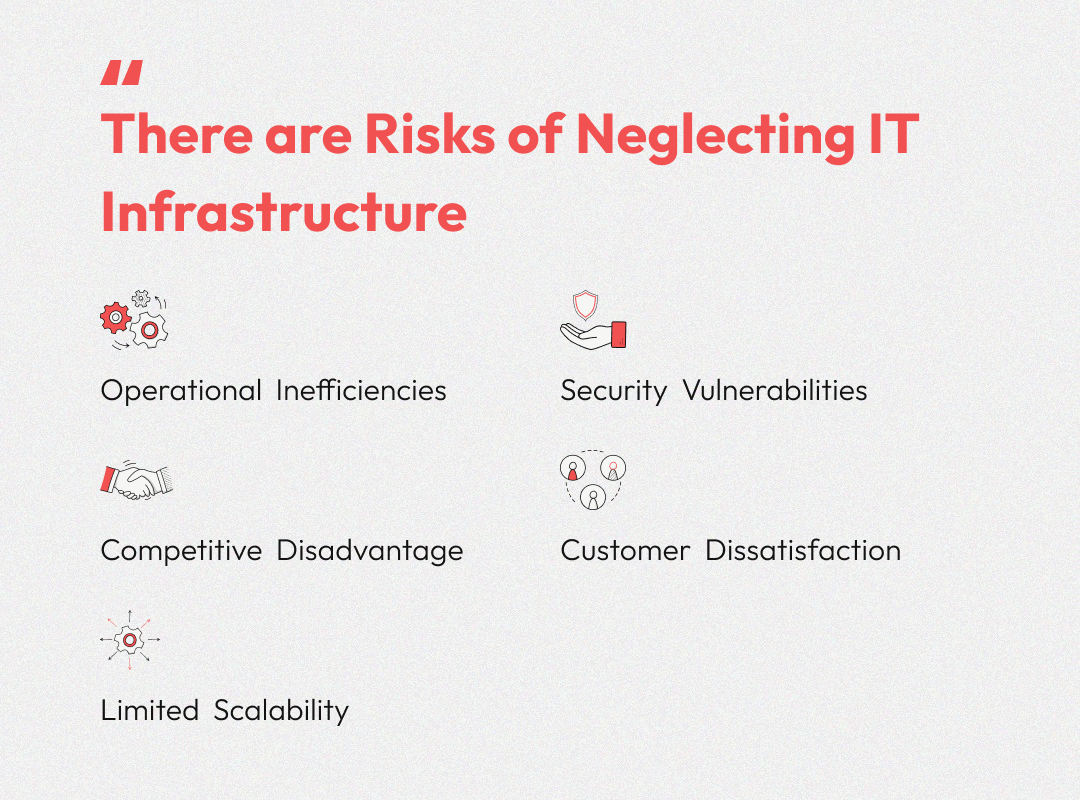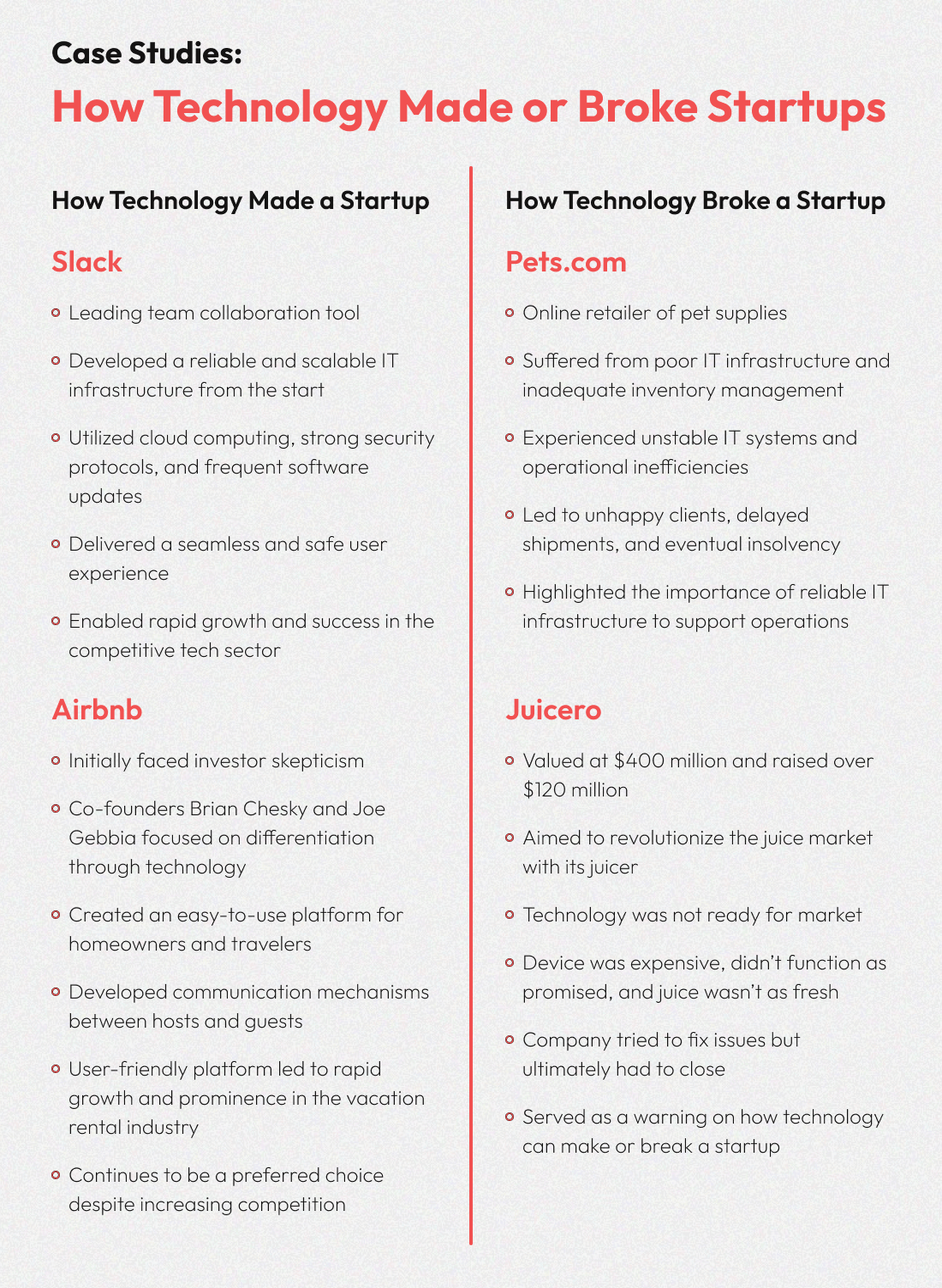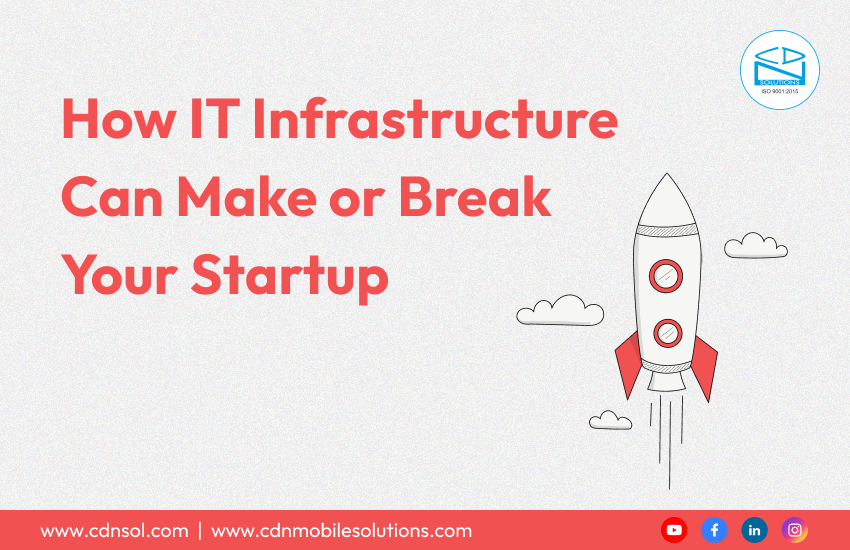Do you think big tech support is just for big companies? No! Every business needs IT infrastructure support, big or small. Technology runs almost every part of any business today. IT infrastructure support helps manage tech like servers, networks, and software. Resolve issues promptly, safeguard data, and guarantee the company’s smooth operation with no obstacles, no delays, and simply easy sailing. This assistance can distinguish between a small firm trying to stay afloat and expanding quickly. It is like having a tech expert by your side.
Modern tech gadgets alone do not make for a good IT infrastructure. It covers everything, from maintaining the efficiency of your customer database to sending and receiving emails. For startups, IT is a make-or-break. It takes startups from merely surviving to thrive. Robust IT support ensures competitiveness, data security, and agile market adaptation. With the strong IT game, your team’s focus is unhindered by tech issues. Customers trust businesses that operate smoothly rather than those with technical difficulties. Hence, investing in solid IT infrastructure is a smart move for business growth.
Table of Contents
The Importance of IT Infrastructure in Startups is Uncompromising
- IT infrastructure supports efficient startup operations like communication, collaboration, and information sharing. Without reliable IT, startups face challenges like delays and decreased productivity.
- Scalable IT infrastructure is essential for startups to handle growth by adding users, increasing storage, and enhancing processing power.
- Cybersecurity is crucial for startups due to limited resources. A robust IT infrastructure with security measures is necessary to safeguard data from breaches, prevent reputation damage, and avoid legal issues.
- In the digital age, IT infrastructure empowers startups to engage with customers through various channels, providing excellent service, collecting data, and creating personalized experiences.
- IT infrastructure gives startups competitive advantages by providing innovative tools like data analytics, AI, and IoT devices.
Key Components of IT Infrastructure for Startups
- Hardware: Computers, servers, routers, and networking equipment are all your hardware. A business must have reliable and high-performance hardware. Having high-quality hardware can boost output, cut down on downtime, and guarantee proper functionality.
- Software: Software is the foundation of IT. It is about having all the essential tools and applications. All your software should be tailored to the industry’s specific needs. Additionally, startups are using cloud-based software solutions to reduce costs and improve accessibility.
- Networking: Startups need a reliable network for connectivity. This includes wide area networks (WANs) for connecting to the internet and outside partners, as well as local area networks (LANs) for internal communication. Startups must ensure that their network infrastructure is secure, reliable, and scalable.
- Data: Data is a valuable asset for any startup. Proper data storage solutions are crucial for managing and protecting this data. Startups should use a mix of on-premises and cloud storage for data redundancy and accessibility. Data backup and recovery solutions prevent data loss.
- Security: Data security is crucial for startups. Startups should put complete security solutions, such as firewalls, antivirus programs, encryption, and safe access restrictions, in place. Employee training and routine security audits are additional tools for spotting and addressing such risks.
- Cloud Computing: Cloud computing offers scalable and cost-effective solutions for various IT needs. Startups may store and manage data, launch apps, and access computer resources on-demand by utilizing cloud services, all without having to make substantial upfront expenditures in hardware and software.
- IT Support: To maintain and debug IT infrastructure, dependable IT support is essential. It is advisable for startups to either hire internal IT workers or form partnerships with managed IT service providers to guarantee seamless system operation and timely resolution of any difficulties.
There are Risks of Neglecting IT Infrastructure

- Operational Inefficiencies
- Startups face IT coordination issues, causing delays and misunderstandings.
- Poor collaboration tools and unreliable systems reduce productivity.
- Poor IT infrastructure leads to frequent downtime and business disruption.
- Inconsistent operational performance hurts startups.
- Security Vulnerabilities
- Poor IT infrastructure in startups leads to cyberattacks and data breaches.
- Startups risk data loss without security, causing financial damage.
- Security breaches damage reputation, affecting customers and business relations.
- Non-compliance with security protocols leads to legal repercussions.
- Limited Scalability
- Insufficient IT infrastructure hinders customer base and workforce expansion.
- As operations scale, inadequate systems can lead to decreased performance.
- IT infrastructure’s lack of scalability can cause frequent disruptions when needs exceed capabilities.
- Startups face higher expenses in upgrading old IT systems, leading to budget overruns.
- Customer Dissatisfaction
- Poor IT infrastructure hampers customer communication, causing slow responses and unsolved issues.
- Inadequate tools lead to poor customer experience, causing undervaluation.
- IT shortcomings hinder customer satisfaction, leading to negative feedback and reputational damage.
- Dissatisfied customers can cost startups business opportunities.
- Competitive Disadvantage
- Startups may fall behind industry trends without strong IT infrastructure.
- Poor IT systems challenge customer service, hindering customer attraction and retention.
- Startups struggle to differentiate offerings from competitors due to a lack of advanced IT solutions.
- Lagging in technology weakens market position and hinders success.
Strategies that You Can Use for Building a Robust IT Infrastructure
- Assess your IT needs: Identifying the unique IT requirements of the startup is the first step towards creating a strong IT infrastructure. Determining hardware, software, and security for business support, startups should consider short-term needs and long-term scalability.
- Invest in quality hardware and software: To guarantee the dependability and efficiency of IT systems, it is imperative to allocate resources towards high-quality hardware and software. Hardware should be selected by startups so that it may grow with the company and yet fulfill performance needs. In a similar vein, picking the appropriate software solutions can boost output, simplify processes, and provide a strong basis for future expansion.
- Leverage cloud services: For their IT requirements, companies might find a scalable and affordable answer with cloud computing. Through the use of cloud services, entrepreneurs can store and manage data, launch apps, and access computing resources as needed without having to make large upfront commitments. Additionally, flexible, cloud services let firms expand their IT infrastructure as needed.
- Implement robust security measures: For entrepreneurs, security ought to be their first concern. Cyberattacks can be avoided and sensitive data can be safeguarded by putting strong security measures in place, such as firewalls, encryption, antivirus software, and secure access controls. Employee training and routine security audits are additional tools for spotting and addressing such risks.
- Ensure scalability: Startups expecting fast growth must prioritize scalability. It is recommended that startups build their IT infrastructure with flexibility and scalability in mind. This will enable them to add more users, store more data, and add more processing power as needed. This guarantees the startup’s ability to run smoothly and effectively even as it expands.
- Partner with IT experts: Startups may guarantee that they have the assistance required to maintain and debug their IT infrastructure by collaborating with IT specialists through the use of managed IT service providers or internal IT professionals. IT specialists can apply best practices, offer insightful advice, and quickly resolve any difficulties that may come up.
- Review and update IT infrastructure regularly: Startups need to frequently assess and update their IT infrastructure to stay up to speed with industry trends and best practices, as technology is always changing. This includes introducing cutting-edge technology that can improve corporate operations, updating hardware and software, and putting new security measures in place.
Case Studies

Decide Whether You Want to Make or Break Your Startup
Research and development of technology can make or kill a firm in its early stages. The ability of a new business to create an original product or service and launch it swiftly determines its level of success. Technology development can help with this.
An ideal technology development partner can facilitate a startup’s transition from idea to product. They can offer the know-how and materials required to transform an idea into a useful good or service. A project can be prolonged by an unsuitable partner, incurring extra expenses and postponing the debut.
When it comes to technological development, startups are playing with very high stakes. However, it is feasible to create a successful product or service and launch it fast with good preparation and execution.
Here are some considerations to make when selecting a partner for technology development:
- Establish the project’s scope
- Think About Your Budget
- Examine Previous Projects
- Think About the Team
- Assess Their Procedure
- Talk on Reporting and Communication
- Take Into Account Their Position
- Carefully read the contract
Startups frequently arise in response to market opportunities that demand agility and concentration to provide excellent client experiences. They have to hit while the iron is still hot. However, a lot of small business owners stumble through the initial phases of their IT needs as demands and problems arise. Why not establish a highly functioning, completely collaborative, secure, and professional environment? There is no need to guess. our small business IT support services enable startups to transform from an organization to a genuine competitive force in the market.
With the aid of CDN Solution’s IT services for startups, new players in the market may quickly establish the dependable IT infrastructure they want to work together, create goods and services, draw clients, and protect their whole enterprise from cyberattacks. Our IT services for startups will quickly set up the network and collaboration space for your business without sacrificing security.

